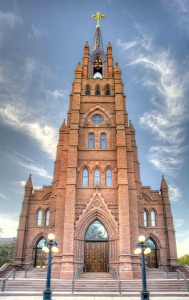As one of the oldest cities in the United States, Charleston abounds with historic architecture and breathtaking sites. Its many historic churches that grace the skyline are the reason for the city’s nickname as “The Holy City.”
Regardless of religious affiliation or denomination, millions of visitors flock to Charleston every year to see the majestic steeples and spires that adorn the city. Many of these churches offer tours certain days of the week so you can explore the intricacies of these incredible sites.
When visiting Charleston, here are some of the historic churches that are sure to fill you with wonder:
Bethel Methodist Church: The Bethel Methodist Church is the third oldest church in Charleston and has remained in its current location since 1880. The church was originally constructed in the gabled meetinghouse style with white clapboards based on a design by Francis Asbury, the first Methodist bishop in the United States. Membership in the congregation of Old Bethel was open to both free blacks and slaves, which adds to this church’s incredible historic significance. Bethel was the only Methodist Charleston historic church that remained open during the Civil War, and it survived the earthquake of 1886 intact. Although there have been interior alterations, the exterior has been well preserved.
Cathedral of St. John the Baptist: The Cathedral of St. John the Baptist is a magnificent brownstone cathedral built on the foundation of the 1854 cathedral that burned down in the Charleston Fire of 1861. Over each entrance are unique stained-glass windows, including the Papal coat of arms and the seal of the state of South Carolina. In the nave you’ll find 14 large two-light windows, representing the Life of Christ from His Nativity to the Ascension. Above the high altar is a five-light window representing Leonardo DaVinci’s “Last Supper.”
The Circular Congregational Church: The Circular Congregational Church, a National Historic Landmark, is one of the few examples in Charleston of the adaptation of the Romanesque style that was made popular by architect Henry Hobson Richardson. The Church, which was constructed in 1892, is an excellent example of this architectural style in its broad roof plane, ribbons of windows and openings, short tower, and large arched entryway. Charleston’s original settlers founded this protestant, or dissenting, church in 1681, though its earliest meeting house was destroyed by fire in 1861. The graveyard is the city’s oldest burial grounds with monuments dating from 1695.
First Scots Presbyterian Church: First Scots Presbyterian Church, the fifth oldest church in Charleston, was constructed in 1814. The massive brick Presbyterian Church has walls that are three feet thick and covered with stucco. Reflecting the heritage of the congregation, the seal of the Church of Scotland is displayed in the stained glass window over the main entrance, and the decorative wrought iron grilles portray thistles, the symbol of Scotland.
The French Huguenot Church: The French Huguenot Church, a National Historic Landmark, is the third church to be constructed on this site. Completed in 1845, it was the first Gothic Revival building constructed in Charleston. The stucco over brick Huguenot church is ornamented with windows, buttresses, and decorative details typical of the Gothic Revival. The use of iron for many of these decorative details was unusual, but reflects the difficulty of obtaining carved stonework during the antebellum period in Charleston. Today it remains unaltered—even the clear glass windows are original.
Which of these historic churches have you visited before? Share your experience in the comments below!







Gail,
You spoke of several beautiful churches but failed to mention the oldest Baptist church in the south – First Baptist Church. Yes in comparison to some of the others you mentioned, perhaps it is plainer, but that is the Baptist way. It is the Mother church to all of the Baptist churches in the south. It was organized in 1682